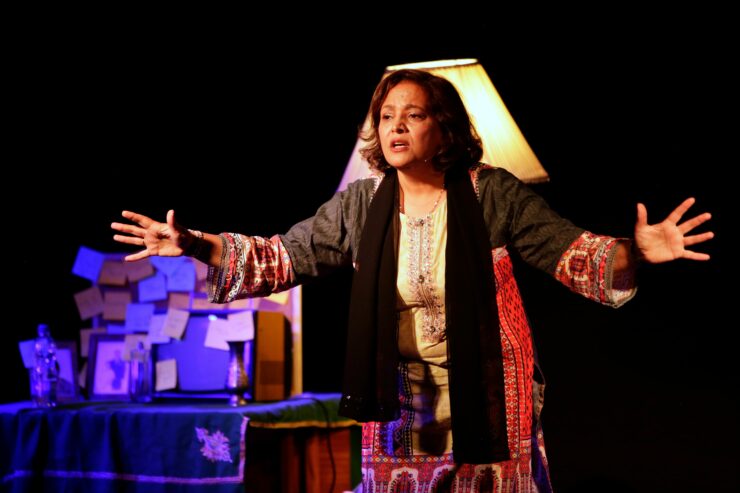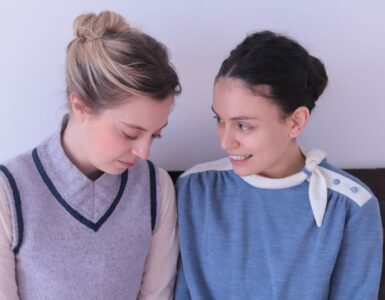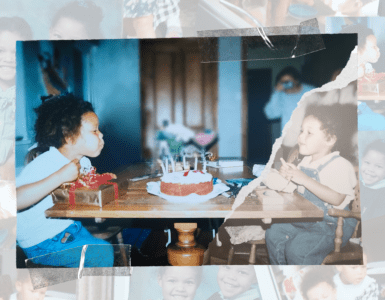With deft charm and wide-open arms, Lubna welcomes you into a slice-of-life hour recounting her parents’ journey from Pakistan to Govan, Glasgow. Spliced with her own journey to the stage, and plenty of cheeky offhand remarks about Scottish and Pakistani upbringings, we’re witness to an empowering glance at the social conditions that define a family, the cultural differences that come to create a community, and a light dash of exploration into political choices and how they impact our individual sense of personhood. There isn’t a moment wasted in this joyous, buoyant tracing of integration, identity, and individuality, and Lubna proves that it really is the little things that can alter a person’s life forever.
We’re offered up a Tunnock’s Cream Wafer as we enter the stage – a welcoming gesture mirroring the importance of the communal sharing of food in Lubna’s mother’s personal journey of admission into a community. Lubna makes it apparent from the moment we enter that the audience is a deeply important part of this piece – while she isn’t here to campaign on one issue specifically, the whole hour has been put together as an expressive gesture that expands her own community – a community of understanding. It is hard to explain just how wonderful a thing to be a part of that is.
Lubna switches between playing her own Mother in various important moments in her life and then responding to them with an impressively open candour. The idea of a mirror image is deeply important to this piece’s success – just as Lubna reflects on her Mother’s life coming to Glasgow some years ago, we’re invited to reflect on the difference between the prejudice that she experienced then and how much our perceptions and prejudices have really moved on nowadays. Every detail has been thought through to achieve this aim – all the way down to offhand jokes about whether Strathclyde is a real university or not, and the show’s message comes across as deeply pertinent in exploring what it means to reflect.
We don’t expect Lubna to be anything like a duplicate of either of her parents, yet it is so clear how their experience of discrimination has impacted on the stories she wants to tell, and later it becomes apparent in the resounding and impactful moments of prejudice she describes in becoming a female actor of Pakistani descent. The storytelling style allows for significant enough verve that Lubna’s delivery does not come across as preachy – instead it is expressive, and the moments of political sharpness that come in seething remarks about the inaction of politicians feel all the more real in contrast. The storytelling is somewhat constrained by the linear narrative that is inevitable in an autobiographical story, but the communicative style and narrative openness is fresh and elastic.
The concept of resolution is a little fraught in the piece – towards the end I found myself wondering how she was going to wrap the story up, as we hear about the final chapters of her parents lives I was hopeful there would be enough narrative emotion to carry that weight. Thankfully, Lubna utilises a wonderful theatrical device in the washing line behind her to represent important moments in her family life, and this allows for everything to flow towards a natural conclusion. It would be wonderful to see Lubna have more time to explore a more vivid and rousing end to the piece, as right now it leans more into its’ sentimentality above all else.
The contrasts explored in the piece between Scotland and Pakistan offer a beautiful lucid pattern that melds Lubna’s mother’s spiritual exploration with the development of community, trust, and devotion to the people around you that trumps even the harshest of horrid prejudices. This ethos offers up an amicable spirit of connection in a place of flux and disorder that leads to the worst of the experiences that Lubna and her family have suffered. Yet, there is a resounding feeling of hope in her work that offers up an ambition for us all to aspire toward.
The humour that Lubna weaves in and out of her own stories gives the entire piece a warm fuzz without ever losing that important emotive style, which I adored. It is great to see someone able to tell an autobiographical story with fizz and fancy, in place of indulgence. We’re here to be a part of her story going forward, and this foray into one-person storytelling is a well-developed, delightfully well-meaning adventure.
Tickbox 2 leans into an ephemeral and personal history to unpack weighty themes with charisma, humour, and Lubna’s characteristic light touch.
Recommended Drink: Grab a cup of tea orr chai to bring along and have with your wafer!
Keep up with Lubna online for future showings of Tickbox 2.
Hear the latest from Marginalised Voices from Fringes across the World
Subscribe to our Email Newsletter so we can send you insightful updates about unheard creative voices working to platform powerful stories. You'll be the first to hear about our content and how to apply to have shows you're working on reviewed.
Powered by EmailOctopus









